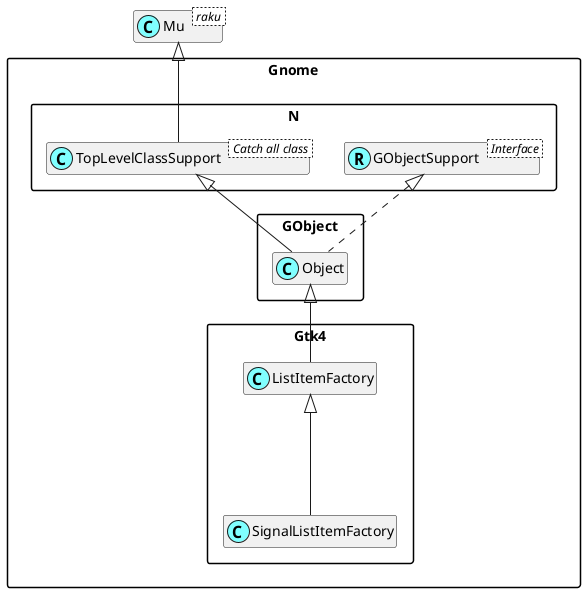
Gnome::Gtk4::SignalListItemFactory
Description
Gnome::Gtk4::SignalListItemFactory is a Gnome::Gtk4::ListItemFactory that emits signals to manage listitems.
Signals are emitted for every listitem in the same order:
1. I<setup> is emitted to set up permanent things on the listitem. This usually means constructing the widgets used in the row and adding them to the listitem. 2. I<bind> is emitted to bind the item passed via I<item defined in Gnome::Gtk4::ListItem> to the widgets that have been created in step 1 or to add item-specific widgets. Signals are connected to listen to changes - both to changes in the item to update the widgets or to changes in the widgets to update the item. After this signal has been called, the listitem may be shown in a list widget. 3. I<unbind> is emitted to undo everything done in step 2. Usually this means disconnecting signal handlers. Once this signal has been called, the listitem will no longer be used in a list widget. 4. I<bind> and I<unbind> may be emitted multiple times again to bind the listitem for use with new items. By reusing listitems, potentially costly setup can be avoided. However, it means code needs to make sure to properly clean up the listitem in step 3 so that no information from the previous use leaks into the next use.
5. teardown is emitted to allow undoing the effects of setup. After this signal was emitted on a listitem, the listitem will be destroyed and not be used again.
Note that during the signal emissions, changing properties on the listitems passed will not trigger notify signals as the listitem's notifications are frozen. See g_object_freeze_notify() for details.
For tracking changes in other properties in the listitem, the notify signal is recommended. The signal can be connected in the setup signal and removed again during teardown.
Uml Diagram

Class initialization
new
:native-object
Create an object using a native object from an object of the same type found elsewhere. See also Gnome::N::TopLevelSupportClass.
multi method new ( N-Object() :$native-object! )
new-signallistitemfactory
Creates a new Gnome::Gtk4::SignalListItemFactory.
You need to connect signal handlers before you use it.
method new-signallistitemfactory ( --> Gnome::Gtk4::SignalListItemFactory )
Signals
bind
Emitted when an object has been bound, for example when a new item defined in Gnome::Gtk4::ListItem has been set on a listitem and should be bound for use.
After this signal was emitted, the object might be shown in a Gnome::Gtk4::ListView or other widget.
The unbind signal is the opposite of this signal and can be used to undo everything done in this signal.
method handler ( $object, Int :$_handle_id, N-GObject :$_native-object, Gnome::Gtk4::SignalListItemFactory :$_widget, *%user-options )
$object; The Gnome::GObject::Object to bind.
$_handle_id; The registered event handler id.
$_native-object; The native object provided by the Raku object which registered this event. This is a native Gnome::Gtk4::SignalListItemFactory object.
%user-options; A list of named arguments provided by .register-signal() in class Object.
setup
Emitted when a new listitem has been created and needs to be setup for use.
It is the first signal emitted for every listitem.
The teardown signal is the opposite of this signal and can be used to undo everything done in this signal.
method handler ( $object, Int :$_handle_id, N-GObject :$_native-object, Gnome::Gtk4::SignalListItemFactory :$_widget, *%user-options )
$object; The Gnome::GObject::Object to set up.
$_handle_id; The registered event handler id.
$_native-object; The native object provided by the Raku object which registered this event. This is a native Gnome::Gtk4::SignalListItemFactory object.
%user-options; A list of named arguments provided by .register-signal() in class Object.
teardown
Emitted when an object is about to be destroyed.
It is the last signal ever emitted for this $object.
This signal is the opposite of the setup signal and should be used to undo everything done in that signal.
method handler ( $object, Int :$_handle_id, N-GObject :$_native-object, Gnome::Gtk4::SignalListItemFactory :$_widget, *%user-options )
$object; The Gnome::GObject::Object to tear down.
$_handle_id; The registered event handler id.
$_native-object; The native object provided by the Raku object which registered this event. This is a native Gnome::Gtk4::SignalListItemFactory object.
%user-options; A list of named arguments provided by .register-signal() in class Object.
unbind
Emitted when an object has been unbound from its item, for example when a listitem was removed from use in a list widget and its item defined in Gnome::Gtk4::ListItem is about to be unset.
This signal is the opposite of the bind signal and should be used to undo everything done in that signal.
method handler ( $object, Int :$_handle_id, N-GObject :$_native-object, Gnome::Gtk4::SignalListItemFactory :$_widget, *%user-options )
$object; The Gnome::GObject::Object to unbind.
$_handle_id; The registered event handler id.
$_native-object; The native object provided by the Raku object which registered this event. This is a native Gnome::Gtk4::SignalListItemFactory object.
%user-options; A list of named arguments provided by .register-signal() in class Object.
 About my projects, references, blog posts, examples and tutorials
About my projects, references, blog posts, examples and tutorials